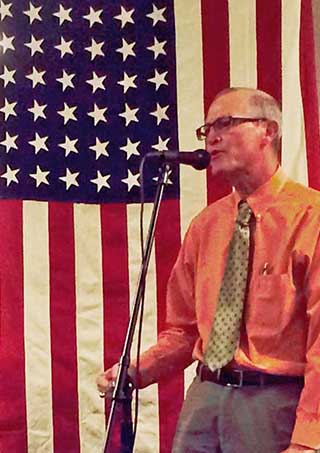Poets, artists, musicians at Sandia celebrate and mourn warriors

Beneath his family’s heritage US flag, Dante Berry (R) addresses the audience at a tribute to veterans in poetry, music, and art that he hosted. (Photo by Neal Singer)
Perhaps because it was almost evening, the 24 people sitting on chairs casually arranged in Sandia’s large Thunderbird cafeteria generated an oddly relaxed feeling, like survivors meeting after a battle, as they listened to poets and a flutist put a human face on recent American wars and military actions.
A large American flag, hung from the cafeteria’s central support post, showed only 48 stars. It had come into Dante Berry’s family in 1945 and was passed from generation to generation. “I take it out twice a year, but this year, three times,” he said of the special event for which he served as host. “It honors the memory of everyone who has served or is serving. Thanks to all veterans.”
The Sandia-sponsored “Tribute to Veterans in Poetry, Music and Art,” was held on Tuesday, Nov. 10. It featured poets Mark Fleisher, a former Vietnam combat news reporter; Rob Mitchell, an Iraq combat veteran and founder of the organization “Full Battle Rattle,” which uses music as therapy to help vets through post-traumatic stress disorder; and Jim Nye, an Albuquerque attorney and poet who served in Vietnam with the 101st Airborne and 5th Special Forces group.
Other poets also participated and patriotic art was on display.
From honor to horror
The poems and comments ranged from deep feeling to self-protective humor, and from honor to horror.
Curtis Keliiaa praised “our valiant warriors who fought for the world to be saved,” and Sandia photographer Randy Montoya wrote movingly about a valiant military friend who had passed on: “He stands his watch where eagles soar.”
Rob Mitchell read from his writings that he “wondered so many times in that war zone/if I would ever make it home,” and, though he seemed physically unscathed after “fighting for those stripes and stars/ if you ask me, I have my scars.”
Fleisher said that because of his first-hand experience with rockets and bombs, when invited to participate in a 4th of July celebration at home, he declined because, having experienced the real thing, “I don’t do fireworks well.” And he said, “Damn the wars but praise the soldiers.”
Andi Penner, president of the New Mexico State Poetry Society, wrote about a woman who stops ironing shirts to watch TV attentively as “the dead soldiers’ photographs appear/eleven, tonight/each with a name, age, rank/and home town/some, with an incongruous smile.”
Among the vivid memories recalled of dust, helicopters, rockets, prayers, broken bodies, and sloshes through mud, Jim Nye added an irreverent note.
“When I got out of the service, I thought I would become human again; instead, I went to law school,” quipped the lawyer.
But Nye also recounted the horror of war memories that, without invitation, entered his civilian moments. He put it this way in his poem, EPIPHANY (quoted with author’s permission):
At the dinner table I looked up
from my steak to see a figure
in black pajamas slide down the
embankment into the rice paddy and
mother poured a glass of milk
while father talked about going to Paris
in the spring and the muddy water slid
past the nearly submerged
VC and my hand trembled as I
gripped the steak knife.
Arnold Puentes made prints of his patriotic art work available free, suggesting that donations be made to organizations like Full Battle Rattle.
At meeting’s end, Ron Hoskie played a measured, graceful version of the old spiritual “Amazing Grace.” The thin, reedy melody from his wood flute seemed to pull listeners beyond the hum of the cafeteria’s large refrigerators into some distant place of quiet reflection. Not an adult stirred while he played.
“Beautiful, very moving,” commented Dante, who then sang “God Bless America” to close the program.
The meeting was hosted by Sandia and community partners, under the umbrella of the Diversity and Inclusion organization led by Esther Hernandez.
Said Esther, “We sometimes forget the price paid by our veterans.”